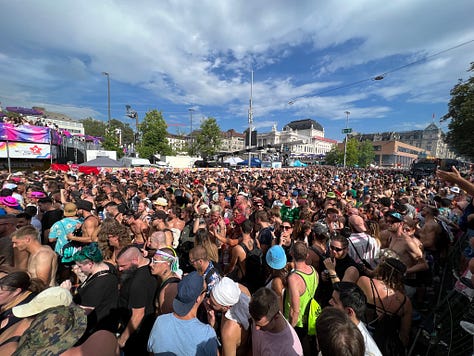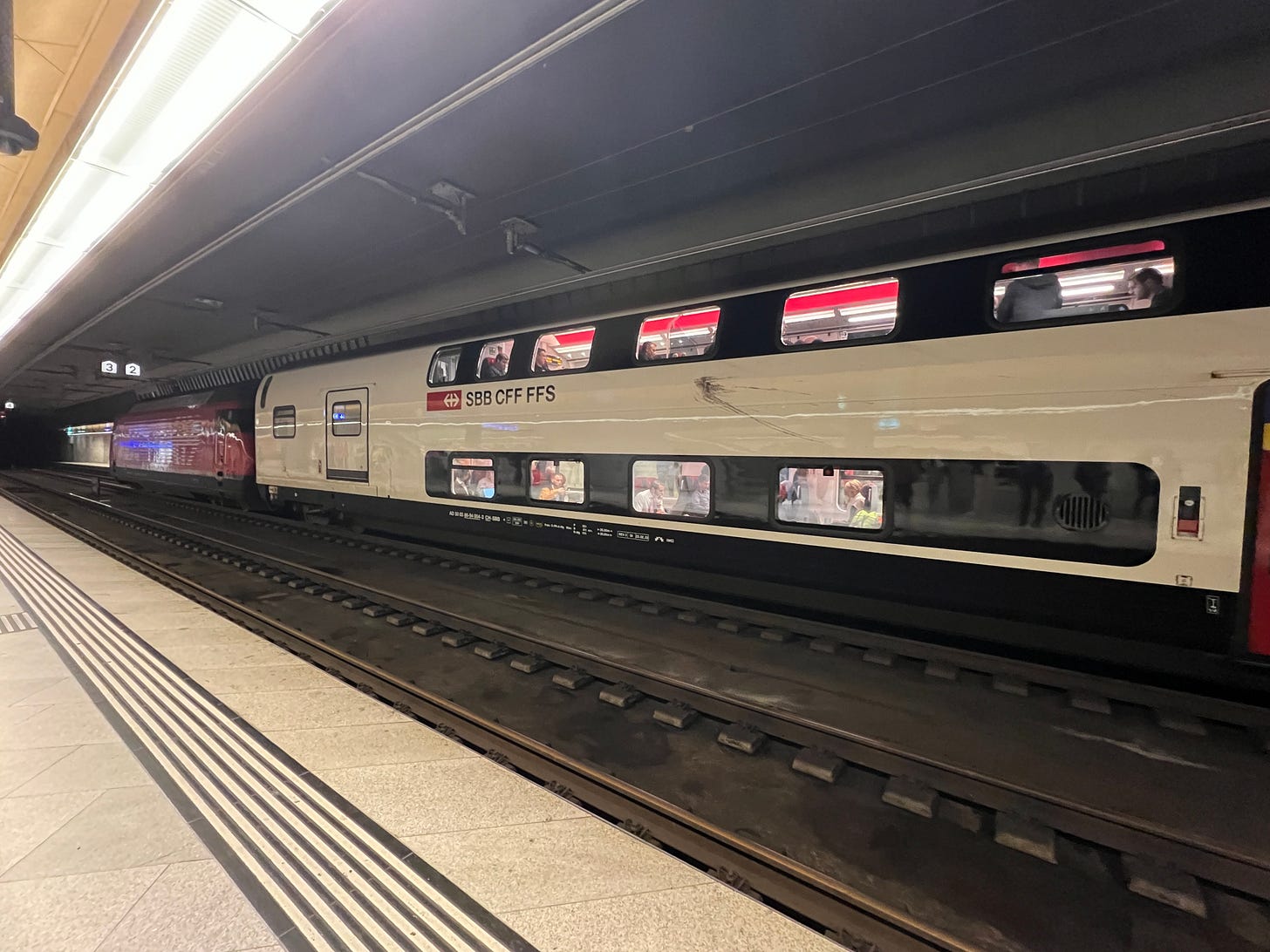A Swiss Dispatch
notes on Switzerland from a summer spent doing research there



I spent the summer in Switzerland working at Nvidia and ETH Zürich (on robotic parkour). It was not my first time there - I had lived in Switzerland many years ago and have spent some time there since, but that was a) in Romandy (the French part), and b) before I was old enough to make interesting observations about my time there. So here are a few collected thoughts that may be of note about the country to those who haven’t visited or only been there for short periods of time. Even if you have no connection to the country, it is hopefully still of interest at least for the reason that things are inexplicably so much nicer there.
Work & School
Zürich has the feel of a tech hub in a way that I haven’t really experienced outside of North America. This is helped by the small size of the city, and also because they have many of the ingredients to make it a tech hub — high wages, loose immigration policies (especially from other European countries), a world-class CS research university (ETH), and the presence of large tech companies. I think the question for Zürich longer term is whether they can have successful startups of their own rather than relying on large foreign employers. To this end, there is a startup scene there, but their ability to create a domestic tech champion is yet to be proven, so the jury is still out on this one.1
With regards to the working culture, it feels as if remote-work is less common even post-Pandemic. Labour laws are also much stricter than in North America — good luck trying to find an open supermarket on Sunday or after 8pm or so.
I don’t have anything particularly new to say on the topic of schooling but it is interesting that in Switzerland overall a much lower proportion of people attend university. They have a two-track education system similar to Germany, and the streaming happens early, around ages 11 or 12, and entry to the tracks is merit-tested. The flip side of this is that entry of university is not competitive at all — people with high school diplomas from the university stream are automatically admitted. This means that “too many” people end up going to top universities like ETHz and EPFL, and consequently these places make the first year brutally difficult, basically to filter students, and consequently the graduation rates are only between 10-30% in STEM fields. I don’t know whether this is good or bad but it it is a very different system than is in place in many other Western and particularly Anglo countries. I think overall it probably helps prevent a march of credential inflation like we have in the Anglo world, but probably misses some late bloomers and also means that Switzerland has to import a lot of talent to fill positions that would otherwise be filled by domestic PhDs.
Language
One of the most interesting aspects of the experience as an international in Switzerland is the country’s relationship with language. Swiss German - the dialect or more accurately collection of dialects which are used there - is both primarily an oral language and isn’t used in formal contexts, though you will sometimes see it in ads. This means that while understanding/speaking German (very broken in my case :) can be helpful for filling out forms or getting by in shops, foreigners can’t really talk to the locals in their own language due to the difficulty of learning or even understanding it.2 This makes somewhere like Zürich feel distinct from many other international hubs, as there is more of a difference between true locals and first-gen immigrants due to the language barrier, despite most of the former speaking English.
Culture
Compared to what you’d find in a North American city, people in clubs etc. there are a much wider diversity of ages in Zürich. It is also a huge techno city so the energy in these places is distinct from more pop-y places I’m used to with a much more chill vibe. I think that this probably reflects a difference in attitudes to a) leisure and b) alcohol in Europe broadly vs NA culture. Smoking in clubs is also not uncommon.



I was lucky that this summer coincided with the first running of Züri Fäscht (Zurich Festival) and Street Parade, both events where millions flood the center of downtown Zürich over the course of a weekend. The scale of these events relative to the size of the city is really crazy, with more than the normal population of the city worth of people being downtown at once. Of course, being Switzerland, the downtown which gets covered in litter is completely spotless by Monday morning…
More people read books in Switzerland than in Canada, and there are consequently better stocked bookstores. Every moderately sized Bahnhof has an Orell Füssli (and possibly other smaller book sellers) which always has, aside from the overflowing shelves of Swiss Krimis, ample classics and philosophy sections. And Amazon won’t be of much help in Switzerland — they don’t operate there, and one can expect to wait for a week and pay exorbitant shipping and tax for books from Amazon.de.
Government and Politics
Switzerland is a weird mix between European social democracy and deep-seated small-c conservatism. On the one hand they have a bureaucracy where everything must be declared - you need to register in the exact area where you live, notify the government exactly which health insurance you participate in, and so on. But this exists side-by-side with a deep scepticism of change and government interference — every week there is some “scandal” in the papers about how solar panels are going to be mandated in some municipality or how the federal government will destroy the country by letting in too many immigrants.
Despite its immense wealth and privileged position as a talent magnet, Switzerland suffers from the same affliction of populism in the form of the SVP (Swiss People’s Party.) But interestingly, as has been the case with many places in Western Europe, despite being the biggest party they have struggled to enact many super reactionary changes. Even their signature achivement, (the revocation EU citizens’ right to movement to Switzerland) a compromise was found which effectively enabled the previous position to continue as before.
Transit
Swiss transit is interesting because it serves dual-purposes — being both a critical artery for local commuters but also as a gateway and huge source of revenue for Swiss tourism. The network's density, even in the many sparsely populated areas of the country, is convenient, and its reliability is famously amazing.3 And it extends to even relatively remote regions of the country which is wonderful for going hiking.
Perhaps part of the reason why the Swiss mid distance rail network is reliable is also that geographically even the denser part of the country is composed of relatively small cities without the population to support their own metro systems, and hence there are large relative numbers of inter-city commuters. Even Zürich, while having a few stations which are connected, doesn’t really have something like a subway system.
For tourists buying one-off tickets, transit is shockingly expensive, but living there as a local there are ways to pay much less (cheaper tickets for locals travelling at night, monthly and yearly passes, and so on.) The difference between these pricings is an interesting example of market segmentation.
Climate Control (of two kinds)
Probably the single worst functioning thing in Switzerland is climate control. Like much of Northern Europe, Switzerland eschews air conditioning, thinking their climate to be sufficiently frigid to can sweat it out in the summer without AC and switch on fans when it gets too hot. This may have been the case 20 years ago, however it is clearly at this point untenable and suboptimal for productivity, as the summers now are so hot that it is hard for many to work in swealtering office blocks designed for temperate alpine climes rather than summers which are now more akin to something you may have once seen in the Riviera.
Relatedly, one thing that struck me is how seriously my friends there, and people in general, take climate change compared to those in English-speaking countries. I do have some friends in Canada who care about climate change a lot as an issue, to the extent that they have changed their lifestyles for it (eg stopped or reduced flying, become vegetarian, etc.) but they are isolated cases. This is the opposite in Switzerland and Europe in general, and people over there generally both seem to be more pessimistic about the impacts of climate change and more willing to make personal sacrafices to combat it.
Moving
Having been back in Toronto for 2 months now, it surprises me how both how quickly I slid into a new routine once I moved to Switzerland, and the speed with which I re-adjusted to being back in Toronto. It feels like a weird form of amnesia as my life just over two months ago was thousands of miles away in a completely milieu and yet I fell very quickly back into old habits. This is both somewhat frightening and interesting to me as I consider what I’m going to do next…
For more reading like this post, but longer and more comprehensive, see Why Switzerland? which has a lot more info than this post but aligns with my experience or Europe Notes, which focuses on Germany not Switzerland but which I felt the desire to link to because it is so fascinating.
I would be most optimistic about their prospects in Robotics or other areas of tech related to physical industry as this plays to their strengths in machine tools, logistics etc. but this could also be biased by my perspective as a roboticist.
to be clear, people who live there for a long time can learn it, but Swiss apparently often consider it actively to be weird even for native German speakers to speak the dialect
unlike the German network’s, which has universally become the universal butt of jokes due to its unreliability

